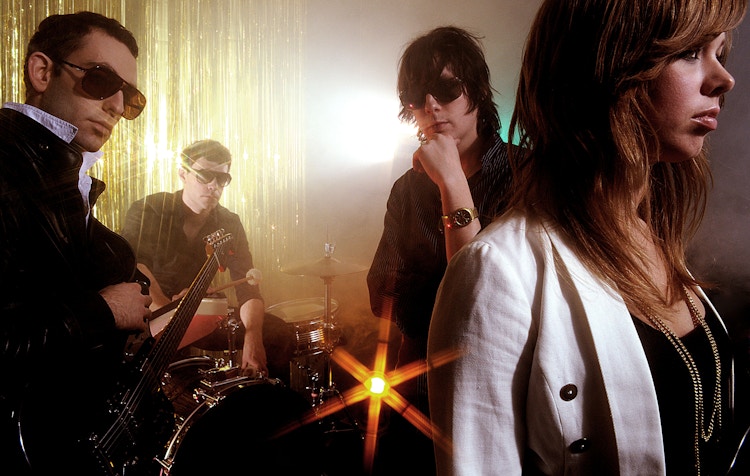"Kill for Love"

After a complete shift in sound and an almost total personnel overhaul, Portland-based Chromatics started foraging through the dreamy landscape of ‘80s Italo disco to build their own achingly romantic synth constructions, joining a budding Euro-synth scene revolving around the Italians Do It Better label, including the likes of Desire and Glass Candy. Behind it all is Johnny Jewel, the label’s co-founder, who is a member of Chromatics and both of the aforementioned bands, making him something of a scene unto himself. Jewel was a key figure behind the much-praised soundtrack to Drive, a movie that brought to life the nocturnal cityscape and dangerous romance that seems so central to the IDIB aesthetic, as well as drawing wider attention to Chromatics through its prominent use of throbbing synth number ‘Tick of the Clock’, a track from the band’s 2007 album Night Drive (picked up on the dominant imagery yet?). The impressive momentum of Jewel’s heady sub-genre has been reflected in the feverish anticipation for Chromatics’ latest album Kill for Love, finally released in the UK after a couple of months garnering praise in the US and all over the internet.
Let’s take a step back before getting out the magnifying glass. One of Kill for Love’s most memorable qualities is its completeness as an album. Over 17 tracks and an appropriately indulgent 90-minute runtime, the record creates a fascinating atmosphere that blends the mad, obsessive romance of youth with an underlying noir edge that brings to mind the muted sheen of neon-drenched streets at night.
The moody undercurrent that binds the album together proves so strong that even opening it with a cover of Neil Young’s legendary ‘Hey Hey, My My (Into the Black)’, a bold decision that thrusts Chromatics onto the precipice of hubris and sacrilege from the off, doesn’t prove a distraction. Even with the original’s unforgettable guitar lick placed front and centre, the song is subsumed by Kill for Love’s atmosphere rather than standing outside of it. Indeed, the song’s most famous line – “It’s better to burn out than to fade away” – provides an important insight into the album’s mentality. There’s a hint of James Dean to these songs, a reckless Hollywood sentimentality that only sits right with the young and the damned.
But even if the album finds us in the province of bright, doomed stars, its undulating set of glimmering synth and freeform ambience reminds us how fulfilling it can be to watch those stars burn. Although the record occasionally blurs out of focus over its epic duration, the sections of gauzy, lovelorn atmospherics are regularly punctured by pin-sharp pop anthems. ‘The Page’, ‘Back from the Grave’ and the title track layer silvery guitar lines onto deep washes of electronics, creating a danceable momentum that tempers the ever-present sense of yearning. ‘Candy’, meanwhile, ramps up the intensity with a hypnotic, disquieting groove and Ruth Radelet’s glassy-eyed evocation of a ruinous obsession that’s veering inexorably towards destruction.
Despite the fact that the album’s extended ambient sections bring with them its only real down points (the 14 minutes of portentous noodling on closer ‘No Escape’ are an indulgence too far), they’re also an essential part of Kill for Love as an experience, serving the dual purpose of heightening the thrill of the album’s poppier moments and providing an emotional and musical bedrock that’s key to its feeling of comprehensiveness. They’re also surprisingly diverse in their expression, ranging from the warm piano and nostalgic tone of ‘Running from the Sun’ to ‘The Eleventh Hour’, which begins with Hitchcockian menace then melts into a glacial thrum. Intermittent musical signifiers add yet more to the glue that sticks the album together, the most obvious being the constant recurrence of subtle, pulsing rhythms, like a fiercely beating heart.
For the vast majority of its runtime, Kill for Love nails the very specific shade of baroque melodrama that Chromatics, and particularly Johnny Jewel, have been chasing for the last five years. Its every pore glistens with seductive threat and a giddy sense of romance that flirts with silliness but rarely slips on to the wrong side of it. For those with even an occasional urge to surrender to the kind of overblown passion that shoves reason aside and demands to be projected on to the largest available screen, Kill for Love could be the drug of choice for a long time to come.
Get the Best Fit take on the week in music direct to your inbox every Friday

Bon Iver
SABLE, fABLE

Mamalarky
Hex Key

Florist
Jellywish





